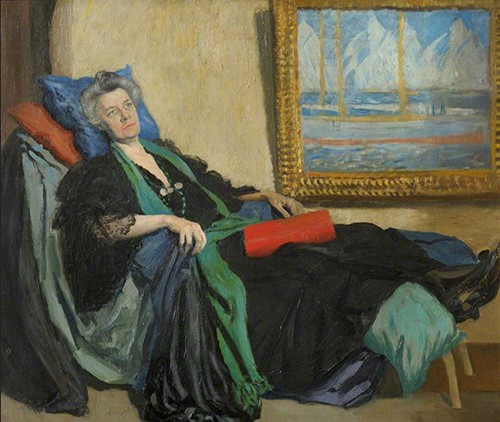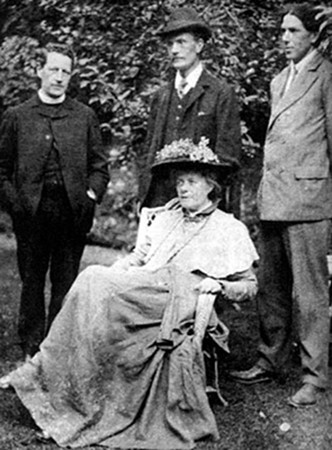Jane Ellen Harrison, 1850 – 1928

Jane Ellen Harrison was a renowned classical scholar and linguist who helped establish the modern studies of Ancient Greek religion and mythology. She lived at the University Women's Club with her partner, writer Hope Mirrlees, from 1922 – 1925. Harrison was the first British woman who achieved the status of "career academic" and was a supporter of women's suffrage, though she herself did not want to vote.
A hyperpolyglot, Harrison learned several languages through a series of governesses, as well as through her own studies, including French, German, Latin, Ancient Greek, Hebrew, and Russian. She taught for many years at the progressive college for women at Cambridge University, Newnham, and studied Greek art and archaeology at the British Museum under Sir Charles Newton between 1880 and 1897. One of her earliest books, Myths of The Odyssey in Art and Literature, was published in 1882.

While at Cambridge, Harrison became the central figure in the Cambridge Ritualists, a group of classical scholars with a deep interest in ritual, particularly as it related to mythology and ancient Greek drama. Inspired by such thinkers as Durkheim and Freud, the Cambridge Ritualists and their collective work in classical philology had a profound influence on classicists and also on literary critics like Northrop Frye. Jane Ellen Harrison's Prolegomena to the Study of Greek Religion was published in 1903 and it remains one of the essential texts for any scholar interested in Greek myth and ritual.
Around 1909, Hope Mirrlees traveled to Cambridge to study Greek at Newnham College under Harrison's tutelage. The two formed an instant bond, with Harrison calling Mirrlees her "spiritual daughter." The two women lived together from 1913 until Harrison's death from leukemia in 1928. Upon Harrison's retirement from Cambridge in 1922, she and Mirrlees moved to Paris, where they studied Russian and collaborated on several translations before returning to London in 1925.
The Board of Managers of the University Women's Club elected Jane Harrison "honorary member of the Club for life." In her letter to Harrison, the Chairwoman said:
The Board has felt very proud to have you as a resident of the Club. It is confident that the scholarly inspiration of your presence and your great addition to the social life of the community have helped immensely during these opening years. As I think you know, we are planning to have in the Club a succession of American professors on sabbatical leave, but I feel sure that we shall never have a resident professor who brings us more scholarly distinction and pleasure than you have given (April 23, 1925, RH archives).
Sources
- Beard, Mary. The Invention of Jane Harrison. Cambridge, MA: Harvard University Press, 2000.
- "'Forgotten' Newnham poet to be celebrated in BBC documentary." Newnham College News online, November 18, 2016.
- Harrison, Jane Ellen and Hope Mirrlees. The Book of the Bear: Being twenty-one tales newly translated from the Russian. London: The Nonesuch Press, 1926.
- Harrison, Jane Ellen, 1850-1928, Jane Harrison Collection, 1870-2001. Newnham College Archives, University of Cambridge. GB 2911 JANE HARRISON.
- Harrison, Jane Ellen. Reminiscences from a Student's Life. London: The Hogarth Press, 1925.
- Peacock, Sandra J. Jane Ellen Harrison: The Mask and the Self. New Haven: Yale University Press, 1988.
- *Harrison's memoirs were published around 1925 by Leonard and Virginia Woolf's The Hogarth Press. She is increasingly recognized by prominent women like Camille Paglia and Mary Beard as a feminist icon.